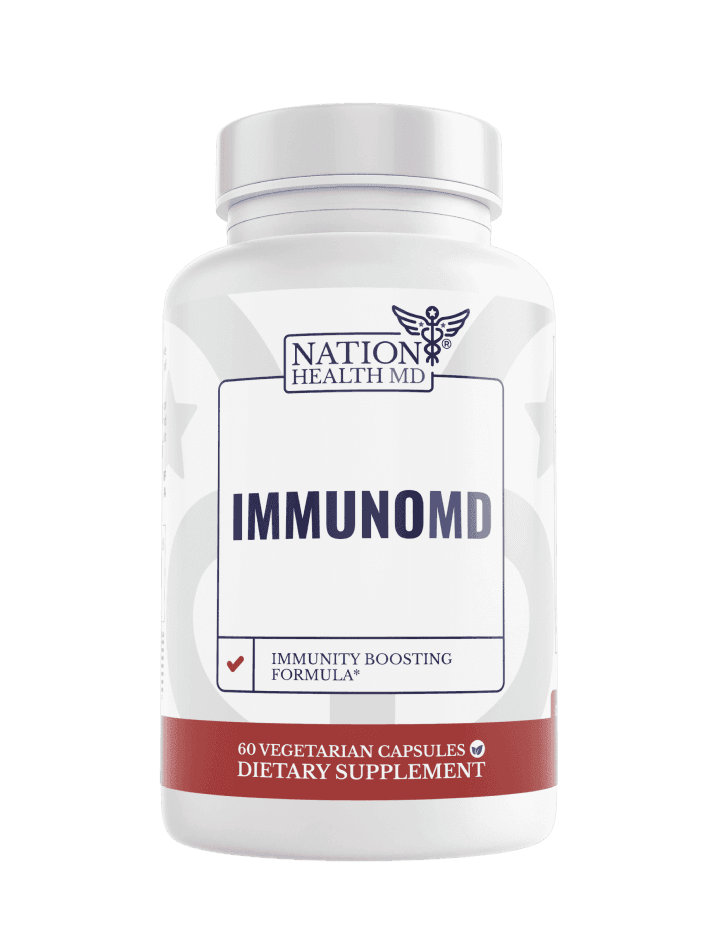Can the Flu Shot Weaken Your Immune System?
Medically reviewed by our experts


As flu season approaches, many people wonder: can the flu shot weaken your immune system? This common concern often arises when considering whether to get vaccinated. With so much information available online, it can be challenging to separate fact from fiction.
This blog explores the scientific evidence about seasonal flu vaccination and immune function. Public health organizations recommend annual flu shots for most individuals, but understanding how these vaccines interact with your body’s defenses is important for making informed decisions.
Key Article Findings
- Flu vaccines do not weaken the immune system but rather train it to recognize and fight specific influenza strains more effectively
- Temporary side effects after vaccination represent normal immune system activation, not immune system compromise
- Annual flu shots are especially beneficial for higher-risk groups including older adults, young children, pregnant individuals, and those with certain health conditions
Understanding How the Influenza Vaccine Works
The influenza vaccine works by introducing your body to specific parts of flu viruses, allowing your immune system to develop protective antibodies without causing illness. There are three main types of flu vaccines:
- Inactivated vaccines contain killed virus particles
- Recombinant vaccines use specific proteins from flu viruses
- Live attenuated vaccines (nasal spray) contain weakened viruses that can’t cause illness
When you receive a flu shot, your immune system recognizes these virus components as foreign invaders. This triggers a controlled immune response where specialized cells produce antibodies that specifically target influenza viruses. These antibodies remain in your bloodstream, creating a memory of the virus.
If you later encounter the actual influenza virus, your immune system quickly recognizes it and mounts a defense using these pre-existing antibodies. This prevents or reduces the severity of infection.
Flu vaccines are reformulated annually because influenza viruses constantly change through a process called antigenic drift. Scientists monitor which flu strains are circulating globally to create vaccines that match the most likely threats each season.
Common Misconceptions About Flu Shots and Immunity
One frequent question is: does the flu shot weaken your immune system? This misconception stems from several misunderstandings about how vaccines work.
Many people associate getting vaccinated with getting sick because they may experience mild symptoms afterward. These temporary side effects – like soreness, low-grade fever, or fatigue – actually indicate your immune system is responding appropriately to the vaccine, not that it’s being weakened.
Another common belief is that natural immunity is always superior to vaccine-induced immunity. While natural infection may sometimes create a stronger immune response, it comes with significant risks of severe illness and complications that vaccines help avoid.
Some individuals report getting sick shortly after vaccination and blame the flu shot. However:
- The flu vaccine cannot cause the flu
- It takes about two weeks for immunity to develop after vaccination
- During this period, you may be exposed to other respiratory viruses
- Flu season coincides with circulation of many different viruses
These timing coincidences create false impressions about vaccination effects, when actually the flu shot is helping your body build targeted protection.
What the Research Shows About Flu Shots and Immune Function
So, does flu shot lower immune system based on research? Scientific evidence consistently shows that flu vaccines do not weaken immune function. In fact, studies indicate the opposite effect.
Research published in major medical journals has examined both short-term and long-term immune responses following influenza vaccination. These studies show that flu shots activate specific parts of the immune system to produce protective antibodies against influenza viruses without compromising overall immune function.
The Centers for Disease Control and Prevention (CDC) and other public health organizations regularly review vaccination research. Their findings consistently support that:
- Flu vaccines create a targeted immune response
- This response does not divert resources from other immune functions
- Annual vaccination helps maintain protection as viruses change
- The immune “memory” from previous vaccinations remains intact
Some people wonder about other factors that might affect immunity. One of the common questions: can antibiotics weaken your immune system? While antibiotics can temporarily disrupt gut bacteria that play a role in immunity, flu vaccines work differently and do not have this effect.
Ongoing research continues to monitor long-term vaccination patterns. A study tracking adults over multiple flu seasons found no evidence of immune system suppression after repeated annual vaccinations. Instead, researchers observed that consistent vaccination provided better protection during severe flu seasons.
The temporary symptoms some experience after vaccination represent the immune system working correctly – building defenses, not weakening them.
Special Considerations for Different Groups
The flu vaccine’s effects on immunity vary across different population groups, with some individuals needing special consideration when deciding about vaccination.
- For older adults (65+), the immune system naturally becomes less responsive with age, a process called immunosenescence. Special high-dose flu vaccines are available for this group, designed to create a stronger immune response. Studies show these formulations help overcome age-related immune changes and provide better protection.
- Young children, particularly those receiving flu vaccines for the first time, may need two doses spaced apart to build adequate immunity. Their developing immune systems often require this two-step approach to create strong protection.
- Pregnant individuals benefit particularly from flu vaccination. The vaccine helps protect both the pregnant person and provides antibodies that pass to the baby, offering protection during the first months of life when infants cannot be vaccinated.
- People with certain health conditions that affect immune function should prioritize annual vaccination. Those with higher risk factors such as heart disease, diabetes, or respiratory conditions gain significant benefits from flu protection.
The Centers for Disease Control recommends annual vaccination for almost everyone 6 months and older, with rare exceptions.
Supporting Overall Wellness During Flu Season
Supporting your immune system during flu season goes beyond vaccination:
- Eat balanced meals rich in fruits and vegetables
- Stay physically active with regular movement
- Prioritize 7-9 hours of quality sleep each night
- Practice stress management techniques
- Wash hands frequently and thoroughly
- Limit close contact with sick individuals
While maintaining these healthy habits forms a strong foundation, many people seek additional immune support during the challenging winter months. Immuno MD offers targeted nutritional reinforcement with key nutrients that work at the cellular level. The science-backed formula features potent ingredients like Propolis, known for its natural protective qualities, and immune-supporting Vitamin C.
The premium quality blend is specifically designed to complement your wellness routine when seasonal demands on your body increase. This extra nutritional support can be incorporated alongside regular healthy practices during flu season.
Conclusion
So, can the flu shot weaken your immune system? The evidence consistently shows it does not. Instead, vaccination prepares your immune system to respond more effectively to specific influenza viruses. Annual flu shots remain one of the most important tools for reducing illness, hospitalizations, and complications during flu season. If you have concerns about vaccination based on your personal health situation, discussing them with your healthcare provider can help you make the most informed decision.
Possible downsides include temporary side effects like soreness at the injection site, low-grade fever, or mild fatigue lasting 1-2 days. Very rarely, allergic reactions may occur. These effects are generally minimal compared to flu illness risks.
Research has not identified any long-term side effects from seasonal flu vaccines. Extensive monitoring over decades shows that any side effects typically resolve within days. The scientific consensus supports the safety profile of annual flu vaccination.
Avoid strenuous exercise and alcohol immediately after vaccination, as these may increase minor side effects. Don’t take fever-reducing medications preventively (only if needed). Continue normal activities but monitor for any unusual reactions.
Wiggins, K. B., Smith, M. A., & Schultz-Cherry, S. (2021). The nature of immune responses to influenza vaccination in High-Risk populations. Viruses, 13(6), 1109.
Different types of flu vaccines. (2024). Influenza (Flu).
Explaining how vaccines work. (2024). Vaccines & Immunizations.
How flu viruses can change: “Drift” and “Shift.” (2024). Influenza (Flu).
Possible Side Effects from Vaccines. (2024). Vaccines & Immunizations.
Trombetta, C. M., Kistner, O., Montomoli, E., Viviani, S., & Marchi, S. (2022). Influenza Viruses and Vaccines: The role of Vaccine Effectiveness Studies for evaluation of the benefits of influenza vaccines. Vaccines, 10(5), 714.
Factors influencing flu vaccine effectiveness. (2024). Flu Vaccines Work.
Jones-Gray, E., et al. (2022). Does repeated influenza vaccination attenuate effectiveness? A systematic review and meta-analysis. The Lancet Respiratory Medicine, 11(1), 27–44.
Weyand, C. M., & Goronzy, J. J. (2016). Aging of the immune system. mechanisms and therapeutic targets. Annals of the American Thoracic Society, 13(Supplement_5), S422–S428.
Flu and Children. (2024). Influenza (Flu).
About vaccines and pregnancy. (2024). Pregnancy and Vaccination.
Vaccination for people who are immunocompromised. (2024). The Australian Immunisation Handbook.
Al-Hariri, M. (2019). Immune’s-boosting agent: Immunomodulation potentials of propolis. Journal of Family and Community Medicine, 26(1), 57.
Moore, A., & Khanna, D. (2023). The role of vitamin C in human immunity and its treatment potential against COVID-19: a review article. Cureus.
Popular Articles
Advertisement. This site offers health, wellness, fitness and nutritional information and is designed for educational purposes only. You should not rely on this information as a substitute for, nor does it replace, professional medical advice, diagnosis, or treatment. If you have any concerns or questions about your health, you should always consult with a physician or other health-care professional. Do not disregard, avoid or delay obtaining medical or health related advice from your health-care professional because of something you may have read on this site. The use of any information provided on this site is solely at your own risk.








